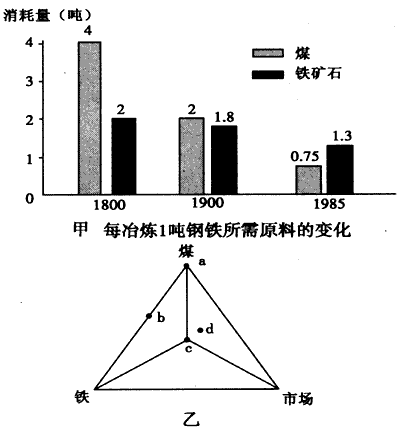问题
选择题
假定钢铁厂选址时只考虑运费,且运费仅与所运货物的重 量和运距成正比,图乙中c点与煤、铁产地和市场的距离相等。 据此完成1~2题。

1、1800年钢铁厂选址应接近以下四点中的[ ]
A、a
B、b
C、c
D、d
2、如果工厂选址在c点最合适,那么[ ]
A、所需煤的重量大于铁矿石的重量
B、所需铁矿石的重量大于煤的重量
C、所需煤铁的重量大于产品的重量
D、生产1吨的钢铁需1吨煤与1吨的铁矿石
答案
1、A
2、D
